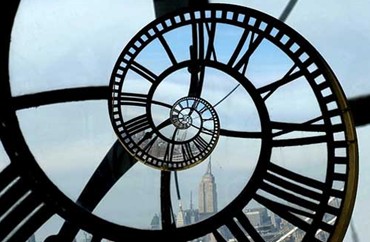夏令时,这是一个大部分中国人早已淡忘,或者不熟悉的制度,但它又是一个世界上半数以上国家都实行的制度。它又称“夏时制”、“日光节约时制”和“夏令时间”,是一种为节约能源而人为规定地方时间的制度。一般在天亮早的夏季人为将时间提前一小时,可以使人早起早睡,减少人工照明,以充分利用自然光照资源,从而节约照明用电。
美式发音 适合精听

Host: It’s daylight saving time, and if you feel a bit 1)grumpy about losing an hour of sleep last night, you can blame one of the first people to 2)advocate having the government do something to get people out of bed early. That was Benjamin Franklin, not because he was in the habit of getting up early. As American Minister to France in 1784, Franklin wrote that he usually slept ’til noon, and was amazed after he forgot to close the 3)shutters one night and sunshine filled his room at six AM.
So did Franklin invent daylight saving time?
David Prerau (Researcher): He probably didn’t do it himself.
Host: The person who actually invented it, I guess, was a British home-builder…
David: That’s right. His name was William Willett. He thought of it in about 1905, and he used to go each morning for an early morning horseback ride, and he was surprised to see that nobody was up and about while he was riding, because he thought it was the most beautiful time of the day. After thinking about this for a long time, he finally conceived of the idea of moving the clocks forward. Willett’s proposal was embodied in a bill that was put to Parliament, but Parliament rejected it for nine years, and eventually Willett died never having seen daylight saving time come to fruition.
Host: It was really World War I that put daylight saving time into use, wasn’t it?
David: Yes, in World War I, there was a big need to save energy. It turned out it was the country of Germany, under Kaiser Wilhelm, that put in daylight saving time first. Once they did, Britain put daylight saving time in effect two weeks later.
Host: And the U.S. followed, too, and used daylight saving time when it got into World War I.
David: Daylight saving time, as you mentioned, has historically been associated with saving energy, but it also reduces traffic accidents and in some countries they consider that the number one benefit of it such as in the U.K. It also reduces outdoor crime like mugging because there’s not much mugging right after sunrise but there’s a lot after sunset. But I think…
Host: All these other benefits.
David: Yeah, the main benefit, I think, is that most people like it. Most people just rather to have that extra hour of light…
Host: It gives us more sunlight.
David: …in the evenings, even in the afternoon or evening than in the morning.
Host: What are some of the more notable, practical or humorous effects of daylight saving time?
David: There was a very interesting period after World War II, and every state, city, or town that wanted to have daylight saving time could have it if they wanted to have it, and they can start and end it whenever they wanted. That led to a chaotic situation around the country in the 50’s and 60’s. In the State of Iowa, in 1964, there were 23 different pairs of starting and ending dates of daylight saving time in use in that one state. And there’s also a famous bus ride, that you could take in the 60’s, from Moundsville, West Virginia, to Steubenville, Ohio, and it was 35 miles, and if you wanted to adjust your watch at each stop to keep track of whether you were in daylight saving time or standard time, you would have to change your watch 7 times in 35 miles.
![]()
![]()
![]()
主持人:现在是夏令时了。如果你因为昨晚少睡了一个小时而感觉不爽的话,那你得怪首个主张政府让人们早点起床的人。那个人就是本杰明·富兰克林,不过他那么做并不是因为他是一个习惯早起的人。在1784年,他是美国派驻法国的专员。他曾写道:他通常会睡到中午才起床。可有一晚他忘了关上百叶窗,意外地发现到了早上六点,房间里已经洒满阳光,这让他惊讶不已。
那么,是不是富兰克林发明了夏令时呢?
大卫·普雷(研究人员):可能不是他。
主持人:我想,真正发明了夏令时的是一名英国的建筑商……
大卫:没错。他叫威廉·威雷特。他是在1905年想到这个事情的。他当时有每天大清早去骑马的习惯,他看到在他骑马时周围都没有人,觉得很惊讶,因为在他看来,那可是一天里最美好的时刻。在对这个问题思考了很长时间后,他想到了把时钟往前拨一个小时的办法。他的建议被写入法令草案,交给了议会,但议会连续九年都否决了这个建议。所以威雷特生前并没有看到夏令时的实施。
主持人:夏令时的真正实施要等到第一次世界大战,对不对?
大卫:对,在一战期间,人们迫切需要节省能源。结果是凯撒·威廉领导下的德国率先实行了夏令时。德国一旦行动起来,英国也在两周后推行夏令时。
主持人:随后,美国在投身一战后也实施了夏令时。
大卫:正如你提到的,夏令时在历史上与节省能源有关,但它也有助于减少交通事故,在一些国家,比如英国,他们把这一点视为夏令时的最大好处。夏令时同时也能减少户外犯罪,如抢劫,因为在太阳出来后,抢劫就很少了,而太阳落山后抢劫就多了起来。不过我觉得……
主持人:原来还有其他的好处。
大卫:对,我想最主要的益处是大部分人都喜欢夏令时。大多数人都想享受多一个小时的日光……
主持人:夏令时让我们多了些阳光。
大卫:……甚至喜欢下午或傍晚的日光多于早上的日光。
主持人:夏令时给人们带来什么值得注意、实用或者是有趣的故事呢?
大卫:在二战后,有一段时间很有意思。那个时候,每个州、市、镇都可以自行决定是否采用夏令时,以及夏令时在什么时候开始和结束。这种做法在上世纪的五、六十年代在全国各地造成混乱。1964年,光是在艾奥瓦州就一共有23组夏令时开始、结束的不同时间。当时在六十年代,你可以乘坐一趟著名的班车。班车的起点是在西弗吉尼亚州的芒德维尔,终点是俄亥俄州的斯托木维尔,全长35英里(约56公里)。在车行驶的过程中,如果你每到一站都按当地所采用的夏令时或标准时间把表调到当地时间的话,你在这35英里的路程里需要调表七次。
翻译:旭文
夏时制知多少
各个采纳夏时制的国家具体规定不同。目前全世界有近1 10个国家每年都实行夏令时。
●夏令时在全欧洲除冰岛外的所有国家实行(冰岛全年实行格林尼治时间)。此方法实行时期从每年三月份的最后一个周日1:00开始,至十月份最后一个周日1:00结束。
●美国夏时制实行与否,完全由各州各郡自己决定。美国夏令时间从3月的第二个星期日开始,在1 1月的第一个星期日结束。
●加拿大夏时制实施日期跟美国一致。加国好几个处于时区边界的地区不实施夏时制。
●墨西哥从4月第一个星期日到1 0月最后一个星期日实行夏时制。
●新西兰由于处于南半球,夏季和北半球相反。它从9月最后一个星期日到4月第一个星期天实行夏时制。
●澳大利亚只有东部和南部各州实行夏时制。
●1986年至1991年,中华人民共和国在全国范围实行了六年夏时制。由于省电效果不抵需要适应时间的弊端,1992年4月5日后不再实行。
